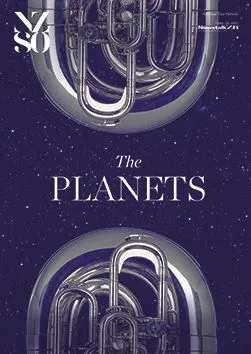Orchestral Tour de Force with the NZSO
Written by

NZSO welcomes Maori New Year with an orchestral tour de force
The New Zealand Symphony Orchestra celebrates Matariki with a musical journey around the solar system and a new commission by New Zealand composer Eve de Castro-Robinson.
English composer Gustav Holst’s The Planets is an orchestral tour de force. From the weighty and arresting, doom-laden rhythmic strains of Mars - The Bringer of War, to the mysterious beauty of Jupiter - the Bringer of Jollity (and the Rugby World Cup theme song), Holst’s memorable seven-movement masterpiece glides seamlessly from gestures of grandeur to glistening moments of introspection.
Each movement of the suite is named after a planet of the solar system and its corresponding astrological character. (Earth was not included). A fellow traveller introduced Holst to astrology during a tour of Spain in 1913 and he soon devoted himself to the study of the planets and the ancient gods associated with them, even learning to cast horoscopes.
From here emerged one of the most popular works of the twentieth century. Originally composed for two pianos and an organ, this brilliant work was finally orchestrated with the help of colleagues, as Holst’s arthritis prevented him from the fiddly work of orchestration. The Planets premiered during the last weeks of World War I on 29 September 1918, with conductor Adrian Boult. It was an immediate success, exciting a frenzy in the press with its kaleidoscope of orchestral colours and originality.
Auckland-based composer Eve de Castro-Robinson’s specially commissioned work The glittering hosts of heaven conjures a similar air of mystery and wonder.
“Rather than being descriptive, like Holst’s The Planets, it is a sonic springboard for me, the players and listeners to consider what it is that surrounds us, that gives us protection, solace and hope,” says de Castro-Robinson. “The music ranges freely from high glittering passages to slow contemplative events and serene passages, but overall is searching and restless in tone, as befits a questioning spirit.”
Dedicated to her parents, The glittering hosts of heaven was inspired by English writer H.G. Wells’ sentiment:
There is - though I do not know how there is or why there is - a sense of infinite peace and protection in the glittering hosts of heaven. There it must be, I think, in the vast and eternal laws of matter, and not in the daily cares and sins and troubles of men, that whatever is more than animal within us must find its solace and its hope.
Matariki is both the name of the Pleiades star cluster and also of the season of its first rising in late May or early June - the beginning of the New Year. The name Matariki is also used for the central star in the cluster, with the surrounding stars named Tupu-a-nuku, Tupu-a-rangi, Waiti, Waita, Waipuna-a-rangi and Ururangi. With the rise of the Seven Sisters, Matariki begins, marking the arrival of the Maori New Year.
“The seven soloists acknowledge the Seven Sisters of the Pleiades. At Matariki, New Year in the Maori calendar, there is renewed respect for the land, and thoughts turn to the past and the future, including the legacy of parents,” says de Castro-Robinson.
Stargaze with the New Zealand Symphony Orchestra this Matariki in The Planets, proudly brought to you by National Tour Partner Newstalk ZB.
NZSO: The Planets
Music for Matariki
National Tour Partner: Newstalk ZB
PIETARI INKINEN Conductor
Members of the Orpheus Choir of Wellington (Friday 14 June)
Members of the Auckland Choral (Friday 21 June)
EVE DE CASTRO-ROBINSON The glittering hosts of heaven
GUSTAV HOLST The Planets
WELLINGTON / Michael Fowler Centre / Friday 14 June / 6.30 pm
TICKETEK / 0800 842 538 / TICKETEK.CO.NZ
AUCKLAND / Town Hall / Friday 21 June / 7.00 pm
THE EDGE / 0800 289 842 / BUYTICKETS.CO.NZ